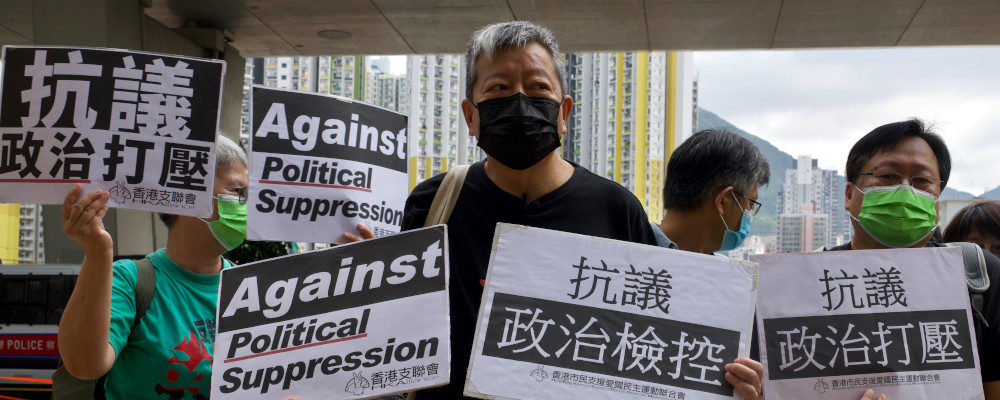Writing about America in the early nineteenth century, French political philosopher Alexis de Tocqueville might easily have been characterizing public discourse today.
Tocqueville was observing an era of turbulent change, provocative pamphlets and raucous in-person debates, nearly 200 years before social media and cancel culture emerged as features of our own political conversations.
He observed a “formidable circle” drawn around thought: “Inside those limits,” he wrote, “the writer is free; but unhappiness awaits him if he dares to leave them… for those who blame him express themselves openly, and those who think like him, without having his courage, keep silent and move away.”
Today, as liberal democracies all over the world grapple with issues related to the limits of tolerance, the (un)acceptability of offensive, insensitive and extreme perspectives, and the bounds of free speech, Tocqueville’s words are perhaps even more apt today than they were nearly two centuries ago.
Recent polling by Public Square and Maru/Blue shows about half of Canadians believe radical ideas should be censored for the public good. A similar proportion believe those who express offensive ideas should lose their jobs.
With such views commonplace across western societies, the “solution” to disagreement too often involves the pursuit — or imposition — of a kind of moral consensus that banishes contrary or marginal perspectives in the name of a tamer, tidier ‘truth.’
This process usually involves setting boundaries on the freedom of expression, through the de-platforming of those who use social media to share controversial views, the legislation of anti-hate speech laws, and the general shaming and punishment of those who voice opinions deemed at odds with received wisdom.
Extinguishing unacceptable perspectives inevitably leads to what John Stuart Mill called the ‘tyranny of the prevailing opinion.’
As Tocqueville put it, the dissenter ultimately yields, “he finally bends under the effort of each day and returns to silence as if he felt remorse for having spoken the truth.”
With uncooperative views effectively banned from polite public discourse (not eliminated, of course, just tucked conveniently out of sight), the idea seems to be that the more reasonable among us can collectively participate in acceptable discussions within emotionally safe bounds.
Views that fit within these confines are considered legitimate; those that do not, are not. Today, as in America in the early 1800s, this narrow approach sits uncomfortably with society’s inherently pluralistic nature.
It ignores the fact that disagreement, even on deeply moral grounds, is a fundamental and integral part of our political and social life. It is an ineradicable product of the diversity of cultures, religions, values, and experiences that shape us as individuals and citizens.
Extinguishing “unacceptable” perspectives is not only futile but harmful, inevitably leading to what John Stuart Mill called the “tyranny of the prevailing opinion.”
The second we start drawing lines around acceptable thought, the whole exercise of free expression is at risk. In the absence of objective delineation between “good” and “bad” opinions, all we can rely on is subjective judgements. Someone, somewhere, is bound to be offended by just about anything.
The fact is, our accepted truths — including those we hold most dearly — need to be constantly tested and proven in order to be kept alive. Even if we have every reason to believe that a particular opinion may be true, we ought to consider Mill’s argument that “if it is not fully, frequently, and fearlessly discussed, it will be held as a dead dogma, not a living truth.”
Mill points out that the greatest victims of stifled dissent are not those being silenced, but those doing the silencing. “If the opinion is right,” he wrote, “they are deprived of the opportunity of exchanging error for truth: if wrong, they lose, what is almost as great a benefit, the clearer perception and livelier impression of truth, produced by its collision with error.”
Historically, ideas deemed too radical or offensive for the societies of their times included the belief that women are equal to men, the idea that the people have the right to govern themselves, the notion of religious freedom, and the assertion that the earth orbits around the sun. Yet in every case, these dissident views allowed for the exchange of error for truth and instigated incredible social, political and scientific progress.
It is exactly this kind of progress we put at risk if we censor the radical and offensive ideas of our time, something half of Canadians would have us do. We must be open to the fact that such thinkers may be among us, conceiving of ideas too abstract, too bold or too overwhelming in scope for us to readily accept.
It is true that for every great innovation in thinking, there may be a thousand more opinions that are wrong, and even some that set us back. But allowing all of these perspectives to be expressed is the cost of an ideas-tolerant environment with progress as its goal.
We cannot, nor should we want to, eliminate disagreement in our conversations, and instead view it as a productive, celebrated element of a truly democratic order. Not only is contestation a means of keeping our most precious truths alive; it clarifies them, bolsters them, and in some cases even corrects them. It is the very foundation of societal progress.
We must embrace dissent in our discourse, even when — especially when — the views in question sound unreasonable or make some of us feel uncomfortable. To fail to do so is to invite tyranny itself.




